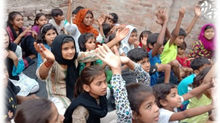Acting in Mercy
- Beverly Van Kampen
- Jan 28, 2017
- 2 min read

Part of our mission in Pakistan is to provide some very basic life-giving helps to people who are in constant need. We have sponsored immunizations when measles began taking babies’ lives in small villages. We have provided warm jackets for children when the winter weather moved in to stay. We have paid for a hospital stay for a man hurt in an accident with a donkey cart and have provided medicines for those suffering from malaria, hepatitis, and diabetes. We provided relocation costs for a servant of God who was being harassed by his own family for converting to Christianity.
Poverty is a terrible thing, wherever in the word we find it. As Jewish scholar Joseph Telushkin has said, “Poverty forces a human being to focus on fulfilling physical needs (most obviously eating) and therefore, dehumanizes more than other types of suffering.” We have seen that dehumanizing effect and want very much to address the underlying issues of poverty, among Christians particularly, in Pakistan. One way is to provide crisis intervention as we have just described. Another, longer-lasting and more humane solution, is to help Christians find employment.
Because they are a small minority, they are the last to be hired and the first to be fired in any job situation. Christians who do find jobs are often relegated to the menial tasks of sweeping the streets (literally - with a broom), harvesting crops, or working in brick factories. The most direct way to counter this prejudice in hiring is to train qualified Christians to establish small enterprises that will hire primarily Christian workers. We are working with Partners Worldwide (PWW), an international mission organization, who has a tried-and-proven model for doing just that. The PWW materials are now translated into Urdu and our first training sessions beginning next month in Karachi, a city of 24 million people (really!) and known as the business center of Pakistan. Already nearly 70 people have signed up for the several-months of training.
_edited.jpg)



































Comments